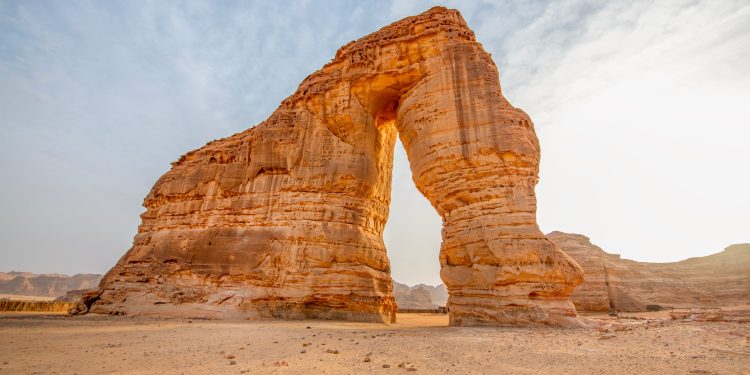As Saudi Arabia strides towards becoming a top international tourist destination and a pivotal regional commercial nexus, there is mounting speculation that the nation might progressively ease its prohibition on alcohol.
In a move seen as testing public sentiment, the Saudi authorities permitted the launch of a liquor outlet within Riyadh’s al-Sarafat diplomatic zone in February, exclusively for non-Muslim personnel of embassies.
Analysts anticipate that the next step could involve granting alcohol licenses to hotels and restaurants in the Red Sea island resorts, part of the ambitious Vision 2030 initiative for economic diversification. This approach would echo the successful resort models found in Egypt’s Sharm el-Sheikh and Hurghada.
The St. Regis Red Sea Resort, an integral piece of the Red Sea Global tourism project, recently held a fashion showcase where modest swimwear was displayed, signaling a shift from the country’s traditionally conservative attire guidelines. While Saudi women generally don black abaya robes, foreign visitors have experienced more lenient dress codes.
Entertainment developments like Red Sea Global and the Qiddiya project near Riyadh are expected to offer more relaxed amenities geared towards international guests, all while maintaining respect for religious principles, according to Saudi political analyst Salman al-Ansari.
“Any such changes will likely be cautiously orchestrated to ensure alignment with Saudi societal norms,” al-Ansari remarked in a discussion with This Week in Asia.
Once a nation that strictly limited entry to foreign Muslim pilgrims visiting its holy cities, Saudi Arabia began issuing tourist visas in 2019, allowing nationals from 63 countries to stay for up to 90 days.
Domestic tourism has surged thanks to substantial investments in the sector as part of the Vision 2030 strategy launched in 2016. From 2020 to 2022, the arts and entertainment industry’s value more than doubled, while expenditure on food and accommodation rose by 77 percent, a report by the Ministry of Economy and Planning revealed in March.
This uptick is partly attributed to the inflow of foreign businesses and professionals to Riyadh and Jeddah, lured by the significant commercial prospects presented by the estimated $870 billion worth of mega-projects slated for completion by 2030.
The crown jewel among these initiatives is Neom, a futuristic city envisioned on the Gulf of Aqaba coastline, which Saudi Arabia shares with Egypt, Israel, and Jordan.
Following the resumption of full-scale pilgrimages post-Covid-19, Saudi Arabia hit its target of 100 million tourists last year and has since raised the bar to 150 million by 2030. Tourist expenditure jumped by 319 percent from 2020 to 2022, and the tourism industry now contributes 6 percent to the nation’s GDP, with plans to boost this to 10 percent by 2030.
With the World Expo 2030 and the 2034 FIFA World Cup on the horizon, Saudi Arabia is poised to attract millions of visitors. Knight Frank, a global real estate consultancy, predicts the construction of 320,000 new hotel rooms by 2030, with a majority being four- and five-star establishments.
“This suggests between 232,000 and 387,000 key tourism workers may require housing as the hospitality sector expands,” Knight Frank mentioned in an April report.
To support these ambitious tourism goals, Saudi Arabia and its Gulf Cooperation Council allies endorsed a plan in May to introduce a joint tourist visa system, akin to Europe’s Schengen visa, by year’s end. Additionally, China’s recognition of Saudi Arabia as an approved destination last year is expected to help attract 3 million Chinese tourists by 2030.
While Saudi Arabia has taken significant strides towards social liberalization, it’s improbable that it will “fully mirror” the measures of its neighbor, the United Arab Emirates, which decriminalized alcohol consumption in 2020. The UAE, already a premier destination for luxury tourism, is on track to inaugurate the Gulf’s first casino resort in 2027.
Despite this, Saudi Arabia is expected to proceed cautiously due to its “deeply rooted religious and cultural context,” al-Ansari noted. However, the regulatory landscape of Neom’s city project indicates a potential shift towards “more liberal policies” aimed at attracting international tourists and businesses.
A February report by The Economist Intelligence Unit characterized Riyadh’s inaugural liquor store as “a very small step” towards making alcoholic beverages accessible to non-Muslim visitors and expatriates. The report foresees a “further relaxation” of Saudi social norms as the nation pursues its Vision 2030 targets, potentially including eased restrictions on alcohol. Even so, the government is expected to implement reforms related to alcohol sale and consumption in a “very gradual and targeted fashion,” it concluded.


